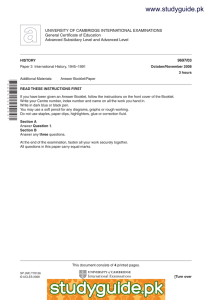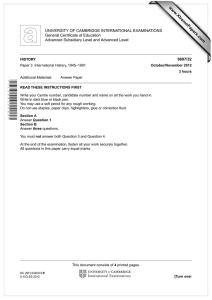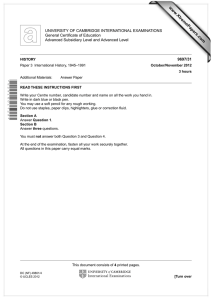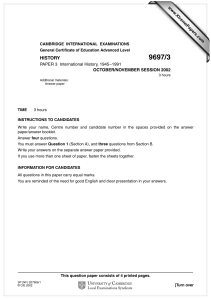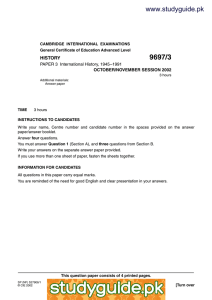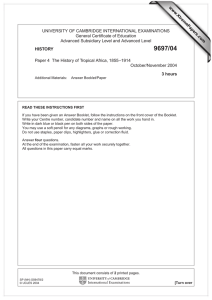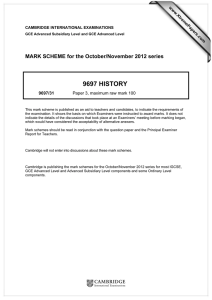www.XtremePapers.com
advertisement
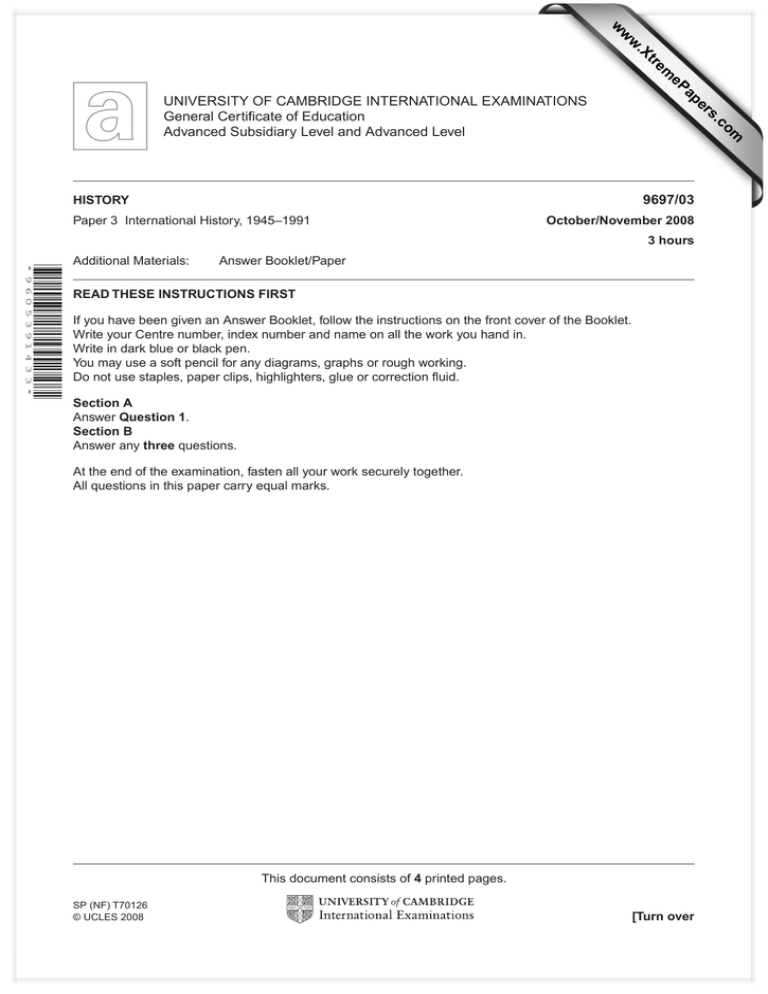
w w om .c 9697/03 Paper 3 International History, 1945–1991 October/November 2008 *9605391433* Additional Materials: s er HISTORY ap eP m e tr .X w UNIVERSITY OF CAMBRIDGE INTERNATIONAL EXAMINATIONS General Certificate of Education Advanced Subsidiary Level and Advanced Level 3 hours Answer Booklet/Paper READ THESE INSTRUCTIONS FIRST If you have been given an Answer Booklet, follow the instructions on the front cover of the Booklet. Write your Centre number, index number and name on all the work you hand in. Write in dark blue or black pen. You may use a soft pencil for any diagrams, graphs or rough working. Do not use staples, paper clips, highlighters, glue or correction fluid. Section A Answer Question 1. Section B Answer any three questions. At the end of the examination, fasten all your work securely together. All questions in this paper carry equal marks. This document consists of 4 printed pages. SP (NF) T70126 © UCLES 2008 [Turn over Section A: THE DEVELOPMENT OF THE UNITED NATIONS, 1945–1991 You must answer Question 1. THE UN SECRETARY-GENERAL AND THE CONGO CRISIS 1 Read the sources and then answer the question. When answering Question 1 candidates are advised to pay particular attention to the interpretation and evaluation of the Sources, both individually and as a group. Source A Having considered the first report of the Secretary-General the Council appreciates his work. The Secretary-General invites Member States to give him assistance. It notes that, as stated by the Secretary-General, the arrival of troops of the United Nations Force in Leopoldville has already had a calming effect and it recognises that an urgent need still exists to continue and increase these efforts. It calls upon the Government of Belgium to implement speedily Security Council Resolution 143 (1960) on the withdrawal of its troops and authorises the Secretary-General to take all necessary action to this effect. It commends the Secretary-General for the prompt action he has taken to carry out Resolution 143 and for his first report. It invites all specialised agencies of the United Nations to give the Secretary-General such assistance as he may require. It requests the Secretary-General to report further to the Security Council as appropriate. Resolution 145 of the UN Security Council, 22 July 1960. Source B The Soviet Premier, Nikita Khrushchev, has disrupted a meeting of the UN General Assembly with several angry outbursts. Twice he pounded his desk and twice he shouted interruptions to show his disapproval at the way UN forces have intervened in the recent trouble in the former Belgian Congo. Mr Khrushchev is calling for the UN Secretary-General Dag Hammarskjold to be replaced by a three-man executive representing the Western, Soviet and neutral camps. His interruptions came during a speech by British Prime Minister Harold Macmillan, who expressed total confidence in Mr Hammarskjold’s ‘energy, resourcefulness and, above all integrity’. While most of the Assembly applauded his sentiments, Mr Khrushchev pounded the table with both fists. A British news broadcast, 29 September 1960. Source C The concept of peace contained in the UN Charter was always to remain Dag Hammarskjold’s guiding principle in tackling such problems as that presented by the liberation of the Congo on 30 June 1960. When the Congo achieved independence on 30 June 1960 it was a unified state. The new government was faced with a difficult situation: the administration, which had been in Belgian © UCLES 2008 9697/03/O/N/08 hands, had broken down; the army had mutinied; a large proportion of the white population had fled; Belgian troops had intervened and on 1 July the province of Katanga had declared its independence. All these factors form the background for a request made to the UN for civil and military aid. Hammarskjold was in a position to offer the Congo civil aid without referring to the Security Council. However, military aid could be given only by the Security Council which he called on 13 July. This meeting was highly important as it marks a turning point in the history of the UN. It was the first time that the UN used armed force to intervene actively in the solution of a problem involving the end of colonial rule. In a resolution unanimously adopted by the Security Council, Belgium was ordered to withdraw her troops from the Congo, and the Secretary-General was authorised to provide whatever military aid proved necessary. Acceptance Speech by Swedish Ambassador for Dag Hammarskjold’s Nobel Peace Prize, made after Hammarskjold’s death, 10 December 1961. Source D In June 1960 Congo finally broke free of an especially incompetent, ruthless and exploitative Belgian colonialism. Strategically located Congo was rich in tin, copper, cobalt and diamonds. Although US President Eisenhower sympathised with the Belgians, he supported the UN team that tried to work out peace terms. The UN group was led by Ralph Bunche, a black American who had won the Nobel Peace Prize for his extraordinary diplomacy in the Middle East. The USSR then tried to enter the scene by accusing Bunche of being merely a front man for US interests. With CIA help the US supported Colonel Mobutu against Soviet backed Patrice Lumumba in the Congolese civil war. In January 1961 Mobutu’s troops killed Lumumba, just as John F Kennedy entered office. Kennedy sympathised with African nationalism but was in no mood to watch the USSR make any gains in Africa. Through CIA and US military aid, Kennedy helped Mobutu gain power. By 1965 the USA had replaced Belgium as the dominant foreign power in the Congo. Mobutu took his place as a virtual dictator, whose regime became increasingly corrupt but more pro-Western. By an American historian, writing in 1989. Source E Dag Hammarskjold is now sometimes recalled as a superman before whom governments trembled and world problems magically dissolved. In fact he faced insoluble problems and did his best to contain them, offering solutions which governments could sometimes accept and often could not. His last year (1960-61) was darkened by a complete break in relations with the USSR and France, a crippling problem for a Secretary-General, who must be able to work with all members of the Security Council. The Congo Crisis, which was at its height when he met his death in September 1961, had already given rise to a major crisis in the UN. It fell to Hammarskjold’s successor, U Thant, to find a way out of these difficulties. Robert Urquhart, former Under Secretary-General at the UN, writing in 1981. Now answer the following question. How far do Sources A-E support the view that Dag Hammarskjold’s involvement in the Congo Crisis had positive results? © UCLES 2008 9697/03/O/N/08 [Turn over Section B You must answer three questions from this section. You must not answer both Question 3 and Question 4. 2 How far was the Cold War, in the period 1945 to 1949, caused by Soviet expansionism in Eastern Europe? 3 ‘The Cold War, in the period 1950 to 1979, showed that the USA’s fear of communist world domination was irrational.’ How far do you agree? OR 4 How far was the direct US military intervention in Vietnam due to President Lyndon Johnson? 5 Who, or what, was responsible for the Sino-Soviet conflict? 6 Assess the impact of the nuclear arms race on the development of the Cold War from 1949 to 1989. 7 ‘The most important factor in the growth of the international economy, from 1945 to 1991, was the continual movement towards free trade.’ How far do you agree? 8 To what extent have the problems facing Third World countries, in the period 1973 to 1991, been the result of the oil crises of 1973 and 1979? Copyright Acknowledgements: Source C © The Nobel Foundation 1961. Source DFrom THE AMERICAN AGE: U.S. Foreign Policy At Home and Abroad, Volume 1 To 1920, Second Edition by Walter LaFeber. Copyright © 1994, 1989 by W. W. Norton & Company, Inc. Used by permission of W. W. Norton & Company, Inc. Permission to reproduce items where third-party owned material protected by copyright is included has been sought and cleared where possible. Every reasonable effort has been made by the publisher (UCLES) to trace copyright holders, but if any items requiring clearance have unwittingly been included, the publisher will be pleased to make amends at the earliest possible opportunity. University of Cambridge International Examinations is part of the Cambridge Assessment Group. Cambridge Assessment is the brand name of University of Cambridge Local Examinations Syndicate (UCLES), which is itself a department of the University of Cambridge. © UCLES 2008 9697/03/O/N/08
